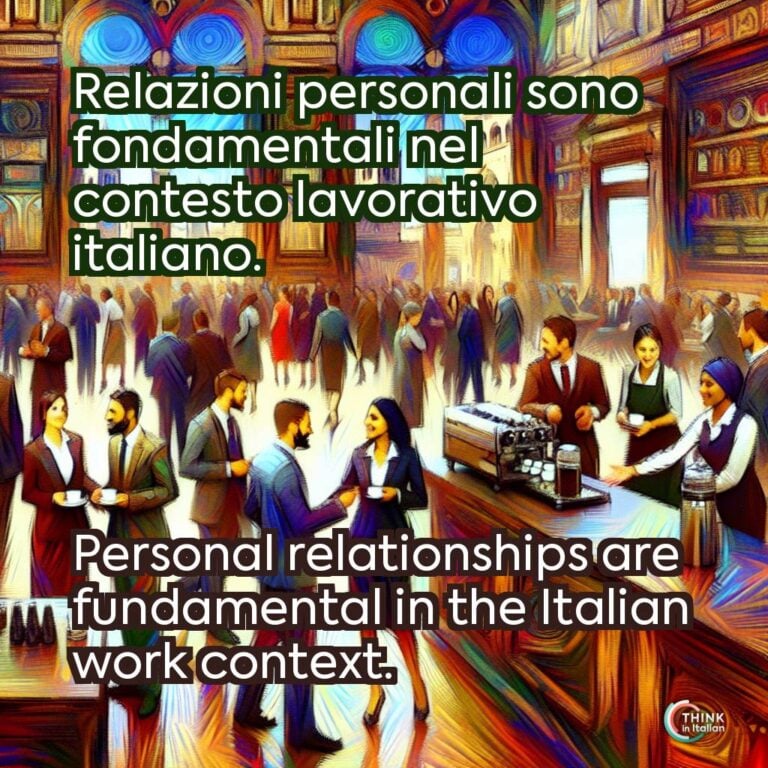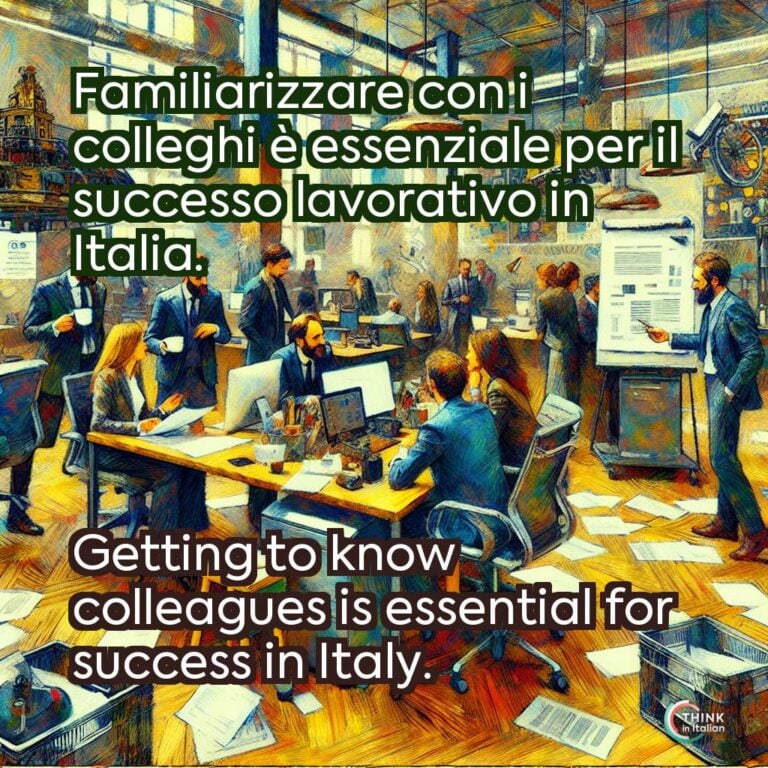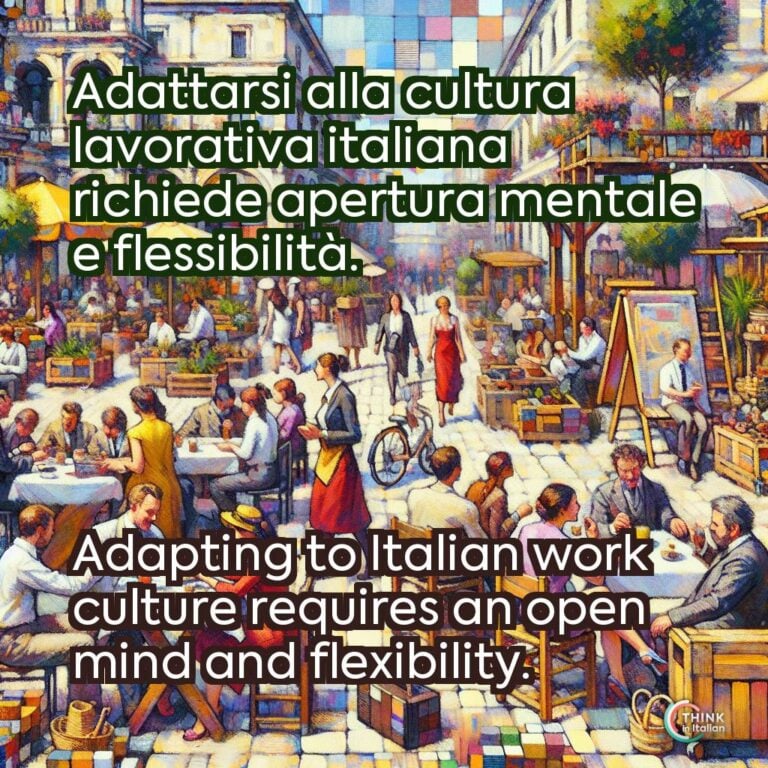Italian Work Culture
Importance of Relationships
One of the first things you’ll notice about Italian work culture is the importance of relationships. Building trust with colleagues and clients is crucial: in Italy, it’s not just about what you know but who you know.
This means that networking and personal interactions are essential to succeed in the workplace and they can significantly influence business outcomes.
Another important aspect of the Italian work culture is the hierarchy. There is a clear chain of command that is based on seniority and experience. It’s essential to understand where you fit into this hierarchy and to show respect to those who are above you.
Work-Life Balance
What is commonly found online or heard generally is that work-life balance is highly valued in Italy. I personally disagree: Italians are very hard workers, and most of them live for working, which is something I very dislike.
This is slightly changing in the new generation, but if I think about my parents and grandparents’ generations, work was the most important thing for them.
Beside this, the standard full-time workweek typically runs from Monday to Friday for a total of 40 weekly hours. Recently, some companies are trying to propose a 32-hours short week, but I believe this new approach still requires some time to be fully accepted.
However, a break from work is always necessary and well appreciated. Pausa caffè (coffee break) is something you might need after many hours of work!
Punctuality and Time Perception
Italians are often know for their unique time perception, which can be quite different from what you might be used to. In informal contexts, like a dinner or a coffee with friends, Italians might arrive late, and this would not matter.
However, when it comes to formal meetings, like in the context of a job, punctuality is respected and appreciated.
Se non arrivi in anticipo, sei in ritardo (if you don’t arrive early, you’re late). Your Italian boss will appreciate if you arrive 5 minutes before the meeting!
Dress Code and Etiquette
Italian office culture places high importance on appearances, therefore it’s crucial to dress professionally. Elegance is usually the key, but, of course, the dress code can change based on the sector and corporate culture.
The use of formal titles is another crucial component of the workplace etiquette in Italy. You should always refer to your coworkers and superiors by their formal titles. And do not forget to use the formal Lei, as sign of respect.
Gender Roles and Diversity in the Workplace
Historically, Italy has faced challenges with gender equality in the workplace, but significant strides have been made in recent years. However, I must sadly confess that ongoing challenges regarding gender pay gap and underrepresentation of women in certain industries still persist.
On the side of diversity, Italy’s increasing multiculturalism due to immigration and globalization, is slowly changing workplace dynamics. Companies are gradually adapting to these changes by promoting diversity and inclusion initiatives.
As an Italian living abroad for many years, I am finally happy to see that Italy is not just for Italians but for anyone who love the country and decided to live and work there.
Evolution of Italian Work Culture
Historical Context
To understand Italian work culture, it’s essential to delve into its historical roots, which are deeply embedded in family-owned businesses and artisanal craftsmanship.
After World War II, Italy experienced an economic miracle (miracolo economico), transforming from an agrarian economy to an industrial powerhouse.
This period saw the rise of influential family-owned businesses, like Fiat and Ferrero, which emphasized loyalty, craftsmanship, and family values.
This familiar footprint still affects the modern Italian work culture, where long-term relationships are often emphasized over short-term gains, reflecting the importance of trust and personal connections.
Regional Variations in Work Culture
Here, I will expose what is said to be happening in the north, center, and south, however I do not love this distinction of the country because if fuels stereotypes.
Northern Italy, for instance, is known for its industrious and efficient work ethic, and is home to major financial and industrial hubs. The work culture here is fast-paced and productivity-driven.
Central Italy balances traditional values with modern work practices. Rome, being the capital, has a significant bureaucratic presence, affecting the pace and formality of business processes.
Finally, southern Italy is said to exhibit a more relaxed and laid-back approach to work. The pace is slower, and personal relationships play a crucial role in business dealings.
Tips to Adapt to Italian Work Culture
Build Relationships With Your Italian Colleagues
Another way to build relationships with your Italian colleagues is by showing an interest in their personal lives. Italians value personal connections, and they are often happy to share details about their families, hobbies, and interests.
Take the time to get to know your colleagues on a personal level, and you’ll find that your relationships with them will grow stronger.
Understand Italian Values and Norms
Be open to understand the fundamental principles that serve as the foundation of the Italian workplace culture: get used to the notion of famiglia (family), as it denotes a closely-knit community of individuals who are devoted to one another.
Respect: another essential value in the Italian workplace. Italians place a strong priority on treating superiors, coworkers, and clients with respect. It is frequently demonstrated through formalities like titles and greetings.
The significance of punctuality in the Italian work culture must also be understood. Italians are renowned for their casual attitude toward maintaining time, although punctuality is still highly regarded on the job.
Being late for meetings and appointments is unacceptable and must be avoided at all costs.
Work Hard
For Italians, work is a virtue. Il lavoro nobilita l’uomo (work enobles men).
Do not allow colleagues and superiors to take advantage of your work and availabilities, but when you go to work, work properly. None asks you to stay longer or work harder: do what you are paid to do, but do it well.
Learn the Italian Communication
Effective communication is indispensable anywhere, however, the Italian communication approach is distinctive and may pose a challenge to those who are not accustomed to it.
Comparing it to my experiences abroad, I noticed that Italians frequently use indirect speech, which suggests that their intended meaning may not be expressed explicitly.
In the Italian work environment, expressive gestures play a crucial role in the communication process and serve to emphasize a point or convey a message. It is important to pay attention to these nonverbal cues as they might provide valuable insight into the message being conveyed.
Cope With Culture Shock
If you just moved or are planning to move to Italy, there is one last piece of advice I want to give you: recognize that culture shock is normal.
Maintain an open mind and a sense of curiosity, accept the unique aspects of Italian workplace culture and make an effort to gain as much knowledge as you can about it.
A mantra that I was constantly repeated when I first moved abroad – I was very young, so a team of experts helped me and other peers – was: non è giusto, non è sbagliato, è solo diverso (it is not right, it is not wrong, it is just different).
This sentence really changed my perception of the outside world and I keep saying it to myself whenever I feel culturally shocked.
Now, it is your turn to embrace these cultural traits and have a fulfilling and successful experience working in Italy.






